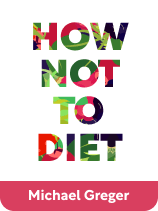

This article is an excerpt from the Shortform book guide to "How Not to Diet" by Michael Greger. Shortform has the world's best summaries and analyses of books you should be reading.
Like this article? Sign up for a free trial here.
What can cause weight gain? Is it your lifestyle or the food you eat?
In the book How Not to Diet, Michael Greger adds a much-needed voice of clarity to the world of weight loss. Before getting into how to diet the right way, he gives reasons for why you might be gaining weight.
Let’s look at what can cause unintentional weight gain.
What Causes Weight Gain?
Before you can lose weight or maintain your current weight, you first need to understand what can cause weight gain. This knowledge will help you make informed decisions about how to achieve and maintain your ideal weight.
People often blame various factors for unintentional weight gain, such as a sedentary lifestyle, insufficient motivation to stick to a healthy routine, low metabolism, or “fat genes.” However, according to Greger’s research, there’s only one factor that determines whether you put on weight: your calorie intake—the number of calories you consume and what form they take.
(Shortform note: While Greger’s explanation for weight gain may appear reductive to some, research confirms that it really is that simple. John Walker (The Hacker’s Diet) explains that your body needs energy—measured in calories—to function. If you eat the exact number of calories your body needs to function, you do not gain weight—even if your diet consists of foods high in fat and sugar. However, maintaining a healthy weight may seem more complicated than this because the number of calories you burn each day does depend on various factors, such as your activity level, your metabolism, and your genetics.)
We’ll discuss the type of calorie intake that leads to excess body weight. We’ll first explain why we’re naturally inclined to crave high-calorie foods. Then we’ll clarify how eating certain types of food—those that are high in calories and low in nutrition—contributes to weight gain.
Factor #1: We’re Hardwired to Crave High-Calorie Foods
Greger argues that the first reason we’re prone to weight gain is that we’re naturally inclined to seek out calorie-dense foods—foods that contain a high number of calories per gram. For example, a gram of butter contains more calories than a gram of flour, which makes the butter more calorie-dense than, therefore preferable to, flour.
He explains that this is because our bodies evolved within an environment of scarcity—we lived in the wild and only ate what we were able to hunt or gather. Since food wasn’t always available, we developed an instinctual preference for calorie-dense foods. The faster we satisfied our caloric needs, the less effort we had to put into hunting and gathering our food. For example, hunting, butchering, and preparing deer meat would take you a few hours of effort but would result in substantially more calories than you’d collect from foraging berries in that same amount of time. Therefore, you’d be more inclined to hunt and eat deer meat than forage for berries.
Additionally, consuming high-calorie foods ensured our survival because it allowed our bodies to store excess calories as fat reserves to fall back on in times of famine.
Our environment has evolved over time, and high-calorie foods are now readily available: Instead of eating only what we can hunt or gather, we go to the store and choose what we want to eat. However, Greger argues, our bodies have not evolved, so we still crave high-calorie foods. This means that we’re constantly tempted to gorge on more calories than we need. Each time we do, our bodies store these excess calories as body fat. But, because we’re no longer afflicted with food shortages, our bodies never get the opportunity to use these fat reserves—resulting in a continual accumulation of fat.
Some of Us Are More Genetically Predisposed to Store Fat Than Others
Many authors mirror Greger’s claim that, thanks to evolution, we’re hardwired to crave high-calorie foods and store excess calories as fat. Some notable proponents of this theory include James Clear (Atomic Habits), Glenn Livingston (Never Binge Again), Neil Shubin (Your Inner Fish), and John Walker (The Hacker’s Diet).
However, while this theory clarifies why we crave high-calorie foods, it doesn’t explain why some individuals can consume excess calories without putting on weight while others store all excess calories as fat. Researchers explain that not all of our ancestors adapted to the environment in the same way—some developed the ability to store more fat reserves than others and passed on this tendency to their offspring. This tendency continues to pass from generation to generation. As a result, some of us are genetically predisposed to store fat while others aren’t.
In light of this research, pharmaceutical companies are examining the genetic similarities among obese individuals. This knowledge may help them develop new drug strategies to prevent or treat weight gain and counter the rising rates of obesity.
Factor #2: Processed Foods and Animal Products Are Calorie-Dense and Low in Nutrition
Greger argues that the second reason we’re prone to weight gain is that the food industry takes advantage of our instinctual preference for calorie-dense foods. It does this by encouraging us to eat processed foods and animal-derived products such as meat, fish, and dairy, which are cheap to produce and distribute.
These food groups directly contribute to weight gain because they lack nutrition and are high in calories. Greger explains that the food industry strips crops of all nutritional value and fiber by either running them through processing mills or feeding them to livestock to create animal-derived products (such as meat, dairy, and eggs). It then adds high-calorie, low-nutrition components such as sugar or salt, oil, preservatives, artificial colorings, and flavorings to create fatty, starchy, sugary, or salty products.
(Shortform note: Michael Pollan (In Defense of Food) expands on how the food industry’s focus on profit promotes weight gain. To maximize profits, food companies focus on producing quantity rather than quality. One way they achieve this is by breeding certain types of food sources for higher yields, such as seeds and livestock. For example, wheat is bred to increase its yield output, and Holstein cows are bred to produce more milk. But manipulating the production of food in this way reduces its nutritional value. Wheat contains 28% less iron than before, and milk from Holstein cows has less butter fat and fewer nutrients than milk from other cow species. As a result, we need to eat more food—which results in more calories—to gain the same level of nutrients that less food provided in the past.)
According to Greger, eating these foods creates four negative consequences that lead to weight gain:
- They decrease your metabolism.
- They increase your appetite.
- They stimulate inflammation in your body.
- They increase the number and size of fat cells in your body.

———End of Preview———
Like what you just read? Read the rest of the world's best book summary and analysis of Michael Greger's "How Not to Diet" at Shortform.
Here's what you'll find in our full How Not to Diet summary:
- How eating processed foods and animal products leads to weight gain
- Why eating plant-based foods reduces the calories your body stores as fat
- What dietary changes will help you shed excess pounds and keep them off






